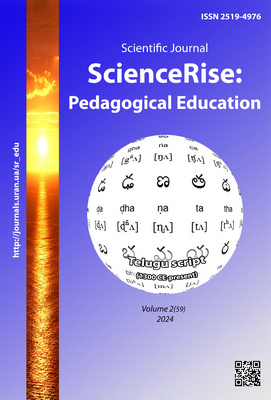Methodological approaches to the problem of forming professional competence of future bachelors in electronics in higher education institutions
DOI:
https://doi.org/10.15587/2519-4984.2024.304931Keywords:
interdisciplinarity, integrated approach, humanities competence, distance learning, technological progress, adaptationAbstract
In this research, the author delves into the results of a thorough study and analysis of methodological approaches to shaping the professional competence of future electronics bachelor’s students in higher education institutions. The focus is on an integrated approach to learning, combining technical components and interdisciplinary connections, and fostering the holistic development of students. This allows for a nuanced portrayal of the multifaceted process of shaping professional competence in the current realities of higher education. The author presents an analysis of scientific inquiries directly or indirectly related to the issue of forming professional competence in future electronics bachelor’s students in higher education institutions. The inadequacy of the study on the chosen issue is noted, necessitating a systematic investigation and the identification of specific measures for optimizing the process of shaping professional competence in electronics. The research also highlights the peculiarities of the impact of military conflict conditions on the process of forming professional competence in future electronics bachelor’s students in Ukrainian higher education institutions. Possible limitations in access to educational resources are analyzed, emphasizing the need for adjusting educational programs in the context of wartime conflict. The focus is directed towards analyzing adaptation strategies of higher education to new realities and developing effective methods to ensure safety and quality learning during military actions. The study underscores the necessity of developing innovative teaching approaches, flexibility in higher education responses to global changes, and establishing effective collaboration with the industry. Overall, the research indicates the relevance of combining technical and humanitarian aspects in the higher education of future electronics professionals and reveals prospects for educational institutions in shaping highly qualified experts capable of meeting the challenges of the contemporary technological world
References
- Kolomiets, A. (2022). Implementation of the advanced learning in the process of fundamental mathematical training of bachelors in the field of electronics and telecommunication. The Scientific Issues of Ternopil Volodymyr Hnatiuk National Pedagogical University. Series: Pedagogy, 1 (2), 81–87. https://doi.org/10.25128/2415-3605.21.2.11
- Ilnitska, K. (2016). Do pytannia pro formuvannia tekhnichnoi kompetentnosti maibutnikh uchyteliv fizyky u protsesi zastosuvannia zasobiv suchasnoi elektroniky y kompiuternoi tekhniky v navchalnomu fizychnomu eksperymenti. Naukovi zapysky. Seriia: Problemy metodyky fizyko-matematychnoi i tekhnolohichnoi osvity, 10 (2), 52–56.
- Tatarchuk, V. (2023). Formation of graphic competence of future specialists in the industry of electronics and telecommunications. Science and Technology Today, 11 (25), 580–593. https://doi.org/10.52058/2786-6025-2023-11(25)-580-593
- Kapiton, A. M. (2023). Information and computational competence of future information technology specialists. Information Technologies and Learning Tools, 93 (1), 49–67. doi: https://doi.org/10.33407/itlt.v93i1.5090
- Gegenfurtner, A., Ebner, C. (2019). Webinars in higher education and professional training: A meta-analysis and systematic review of randomized controlled trials. Educational Research Review, 28, 100293. https://doi.org/10.1016/j.edurev.2019.100293
- Striuk, K. M. (2019). Information and communication technologies as a means of forming the professional competence of future specialists in computer engineering. Pedagogical Sciences Reality and Perspectives, 69, 251–255. https://doi.org/10.31392/2311-5491/2019-69.57
- Striuk, K. M. (2017). Pedahohichni umovy formuvannia profesiinoi kompetentnosti maibutnikh molodshykh spetsialistiv z kompiuternoi inzhenerii. Virtus Scientific Journal, 17, 159–163.
- Matusz, M. (2008). Kompetencje informacyjne nauczycieli i uczniw. Edukacja Technika – informatyka – edukacjɚ. Rzeszow: Uniwersytet Rzeszowski, 2008. Tom X. Teoretyczne i praktyczne problemy edukacji informatycznej, 189–200.
- Chemshyt, V. H. (2012). Intehratsiia tekhnolohichnoi osvity dlia rozvytku kompetentnosti osobystosti. Tekhnolohii intehratsii zmistu osvity. Intehratsiia zmistu osvity za zasadakh osvity dlia staloho rozvytku». Poltava: POIPPO, 4, 293–300.
- Carberry, A. R., McKenna, A. F. (2014). Exploring Student Conceptions of Modeling and Modeling Uses in Engineering Design. Journal of Engineering Education, 103 (1), 77–91. https://doi.org/10.1002/jee.20033
Downloads
Published
How to Cite
Issue
Section
License
Copyright (c) 2024 Lidiia Boiko

This work is licensed under a Creative Commons Attribution 4.0 International License.
Our journal abides by the Creative Commons CC BY copyright rights and permissions for open access journals.
Authors, who are published in this journal, agree to the following conditions:
1. The authors reserve the right to authorship of the work and pass the first publication right of this work to the journal under the terms of a Creative Commons CC BY, which allows others to freely distribute the published research with the obligatory reference to the authors of the original work and the first publication of the work in this journal.
2. The authors have the right to conclude separate supplement agreements that relate to non-exclusive work distribution in the form in which it has been published by the journal (for example, to upload the work to the online storage of the journal or publish it as part of a monograph), provided that the reference to the first publication of the work in this journal is included.







